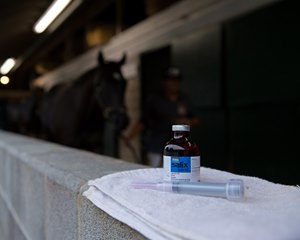Kentucky Equine Council Hears Pitch for Stem Cell Trial


In the midst of a phaseout of the diuretic Lasix in some racing jurisdictions, options for racehorses who bleed in their lungs might not be limited to a simple diet of hay, oats, and water.
Speaking during a video-conference meeting of the Kentucky Equine Drug Research Council Sept. 11, representatives of the regenerative medicine company ReCellerate pitched the council for a clinical trial of the company's Equiflow stem cell-derived treatment. Equiflow has shown early indications of controlling exercise induced pulmonary hemorrhage, the company claims.
Though the council did not take action, seeking more specifics on a possible trial, information on the program and its initial returns were presented.
The product, a concentrated protein serum administered with a nebulizer, is estimated by the company to be two to three years away from receiving conditional approval from the Food and Drug Administration. ReCellerate says it repairs capillary damage by regenerating and strengthening the ruptured blood vessel walls, which they say can stop or slow the regular occurrence of bleeding.
Not a race-day medication, its recommended treatment falls 7-10 days before a race. More severe bleeding may require multiple treatments. Its cost was not discussed.
Video
An earlier study offered by ReCellerate said Equiflow had been trialed on 18 horses at Middleburg Training Center in Virginia. Of this sample, company officials spotlighted the success of Celtic Katie, who won the Geisha Stakes at Pimlico Race Course in 2014 for owner Lewis Family Racing Stable and trainer Christopher Grove. According to the company, she was a filly who would bleed after being given Lasix for morning workouts.
Of these 18 horses, 15 were monitored throughout the study. Fourteen showed a significant reduction in bleeding, and 11 showed no bleeding at all, according to the company's supplied figures. More recent data was not provided to the council.
Questions about how many horses in Kentucky could potentially receive it, as well as the need for a control group, were raised by some EDRC members.
"From my perspective anyway, this is very interesting and we should need something like this," said veterinarian Dr. Johnny Mac Smith. "But I would like to see the study design fleshed out before I would make a decision."
Though ReCellerate officials emphasized the product is biologic, not a race-day medication, that claim was met with caution from the council's Michael Kilgore.
"We always talk about, you know, natural products not being drugs, but as we all know, if you take testosterone out of anybody on this planet and you give it to somebody else, it becomes a drug again," he said.
Eventually, the EDRC tabled action on the clinical trial until it hears more from ReCellerate before its next meeting.
"We can provide that, I would say conservatively within the next two weeks, ideally, in a shorter period of time," ReCellerate founder Karl Nobert told the council. "It will not be a final approved study design, but we can provide an overview and also parameters of how such a study would be set up and what we would be proposing."
Also Friday, the council deferred action on discussed clenbuterol restrictions and heard of a proposed study to conduct videoed, endoscopic examinations meant to track the condition of horses who are racing without Lasix, which has been used to control bleeding.
Along with some other major racing states, 2-year-olds in Kentucky are currently racing without Lasix, and next year the diuretic will not be allowed in the state's graded stakes races.
